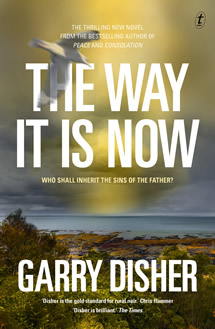Reviewed by Robert Goodman.
By Garry Disher, Text, $32.99.
 Three time Ned Kelly Award winner Garry Disher returns to his old stomping ground (and increasingly common haunt of many Australian crime writers) of the Mornington Peninsula for his latest stand alone crime novel The Way It Is Now. Like all of Disher’s recent work (and implied by the title to some extent), the plot and the characters are used to explore a number of current hot button issues but also to look at how society and its attitudes have changed in the last twenty years.
Three time Ned Kelly Award winner Garry Disher returns to his old stomping ground (and increasingly common haunt of many Australian crime writers) of the Mornington Peninsula for his latest stand alone crime novel The Way It Is Now. Like all of Disher’s recent work (and implied by the title to some extent), the plot and the characters are used to explore a number of current hot button issues but also to look at how society and its attitudes have changed in the last twenty years.
The book opens in January 2000, newly minted policeman Charlie Deravin is shuffling between his recently separated parents and, along with his brother, helping his mother get rid of Shane Lambert, her creepy housemate who does not seem to have any boundaries. Not long after that, on a day when Charlie is engaged in a manhunt for a missing school boy his mother also goes missing in a suspected murder. Charlie’s father was suspected for the disappearance but nothing has ever been proved. Cut to the end of 2019 and Charlie has moved back into his father’s old place in disgrace, suspended for striking a fellow officer but also for helping a juror do her own investigation during a high profile rape trial. He is still on the trail of Lambert who also went missing soon after his mother’s disappearance, sure that Lambert holds some clues to the crime. And then two skeletons are found under the slab of his mother’s old house and the past surfaces with them.
Disher takes all of these elements to spin a tale about modern Australia. The aborted and now rescheduled rape trial of a star footballer brings out issues of sexual abuse and power, there are true crime podcasters in the mix and a return to the early days of Covid and the impact that it would have on lives and families. But because Deravin is on the outer, the coalescence of all of these issues and events at the same time and around the same person feels a little more forced than in Disher’s more procedural novels. And rather than solving the main mystery, Deravin stumbles into the answer and has it laid out to him and a confession.
There is plenty for readers to sink their teeth into in The Way It is Now, anchored around another well drawn and relatable protagonist. And while it is not the absolute best of Disher, it is still more evocative, topical and well-constructed than most crime fiction out there.
This and over 700 more reviews can be found on Pile By the Bed.











